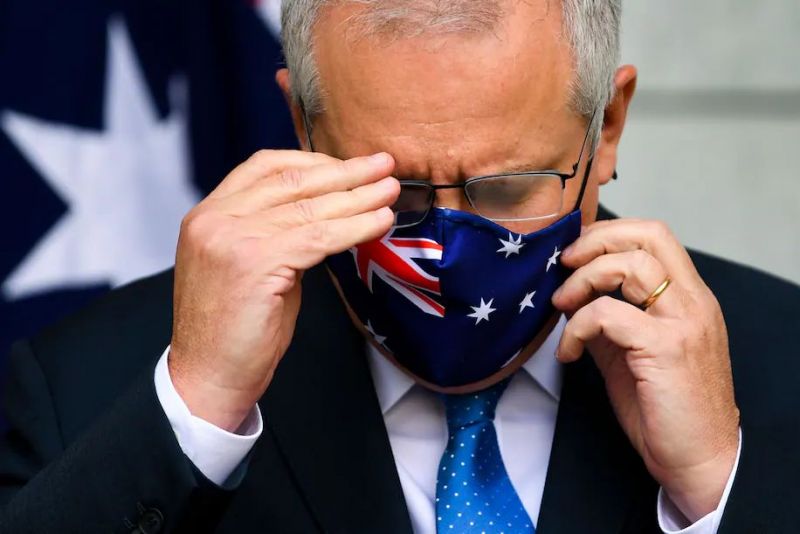
Most people know someone who did well in life when young, only to fail later. Beguiled by their early success, they took their foot off the accelerator, believing that fate would always be kind.
Welcome to the story of Australia. The country has enjoyed great success in the battle against covid-19, but now finds itself falling victim to complacency.
Prime Minister Scott Morrison deserves some of the blame. Back in March, he declared that the vaccine roll-out was “not a race.” Four months later, it seems clear that he was wrong.
With fewer than 6 percent of the population fully vaccinated, Australia is now dead last among Organization for Economic Cooperation and Development countries, according to the latest calculations by the website Our World in Data. This rate compares to more than 46 percent in the United States, 48 percent in the United Kingdom and 62 percent in Israel. The Australian government’s own calculations, based on those over 16, shows nearly 8 percent as fully vaccinated.
Sydney, the country’s most populous city, is now back in lockdown. The source? Apparently a single unvaccinated limousine driver who transported international air crew to their hotel. So far, that infection has spread to around 200, ushering in a two-week lockdown in which the city’s 5 million residents are required to work from home when possible and accept no visitors. Lockdowns in Perth, Darwin, Brisbane and Alice Springs have followed.
Morrison has deflected criticism of the tardy vaccine roll-out. As he put it on breakfast television last week: “It would be a mistake to think that if you get high rates of vaccination that you won’t get cases. The U.K. is proving the exact opposite of that.”
Others, including from the prime minister’s own party, have been more insistent about the importance of vaccination. New South Wales Health Minister Brad Hazzard, in charge of the Sydney response, points to a recent Sydney birthday party in which 24 of the 30 attendees all contracted covid-19. The six who tested negative were all vaccinated health workers.
The opposition Labor Party has described the vaccine roll-out as more of a “stroll-out,” and has seized on admissions from one government minister that we are now “at the back of the queue” for imported vaccines. Finance minister Simon Birmingham blamed delays on Australia’s relatively covid-free status, saying “European countries and drug companies have favoured those nations who’ve had high rates” of covid-19 for vaccine deliveries.
But others blame the government for being slow in signing contracts with vaccine makers such as Pfizer and Moderna, and for placing too much reliance on locally-manufactured supplies of the AstraZeneca vaccine — a vaccine whose roll-out was then tarnished by the government’s own confused messaging.
The AstraZeneca vaccine was initially touted as the main choice for all adult Australians, then — after the emergence of a rare blood-clotting side effect — was recommended first to those over the age of 50, then later limited to those over 60 (unless they’d already had their first AstraZeneca dose).
Things only became more confusing this week when the prime minister noted that those under 40 were free to volunteer for an AstraZeneca jab, leading to a squabble in which the Queensland premier made exaggerated claims about its risks.
What a mess.
Meanwhile, both state and federal governments seem to perpetually announce rules which most Australians had imagined were already in place. Those transporting air crew will now need to wear a mask and be vaccinated, we were told last week, a rule that many — including the NSW police commissioner — thought might already be in place.
Or, early this week, we were told those who work in elderly care will have to have at least one jab by mid-September, surely a tardy ruling given that the bulk of Australian covid-19 deaths have occurred in aged care — 685 of the country’s 910 deaths.
Perhaps Australians and their governments have simply been a victim of their own success; the country’s death rate — at less than 4 per 100,000 — is still among the lowest in the world. Australians have also felt protected in what some have called “the new hermit kingdom." Its policy of closed borders and mandatory hotel quarantine for returning citizens has left 34,000 Australians still queuing for the right to come home, in what some see as an abrogation of their rights as citizens. Those gates were closed even tighter late this week, with Morrison announcing a 50 percent reduction in overseas arrivals. These factors may also be adding to vaccine hesitancy; the fear of side-effects rises in importance when the risk of contracting the disease is so low.
But, as Australia’s near-neighbors such as Taiwan and Singapore have recently shown, early success can rapidly evaporate. What seemed like a low-risk strategy of a low-speed roll-out can become high-risk within weeks.
On Friday, Morrison finally talked about a vaccination timetable, saying he believed “we’ll be in a position by the end of the year to have provided every Australian who wants a vaccine to be able to have received one.”
It turns out it is a race, after all.
Richard Glover presents the "Drive" show on ABC Radio Sydney. He’s a former news editor and European correspondent for the Sydney Morning Herald and author of 12 books, including the best-selling memoir “Flesh Wounds."
